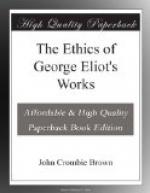Adam Bede contrasts at nearly every point with Arthur Donnithorne. Lovable is nearly the last epithet we think of applying to him. Hard almost to cruelty toward his sinning father; hard almost to contemptuousness toward his fond, foolish mother; bitterly hard toward his young master and friend, on the first suspicion of personal wrong; savagely vindictive, long and fiercely unforgiving, when he knows that wrong accomplished;—these may well seem things irreconcilable with any true fulfilment of that Christian life whose great law is love. Yet, examined more narrowly, they approve themselves as nearly associated with the larger fulness of that life. They are born of the same spirit which said of old, “Woe unto you, Scribes and Pharisees, hypocrites!” fulfilments, howsoever imperfect, of that true and deep “law of resentment” which modern sentimentalism has all but expunged from the Christian code. The hardness is essentially against the wrong-doing, not against the doer of it; and against it rather as it affects others than as it burdens, worries, or overshadows his own life. It subsists in and springs from the intensity with which, in a nature robust and energetic in no ordinary degree, right and wrong have asserted themselves as the realities of existence. Even Seth can be more tolerant than Adam, because the gentle, placid moral beauty of his nature is, so far as this may ever be, the result of temperament; while in Adam whatever has been attained has been won through inward struggle and self-conquest.




